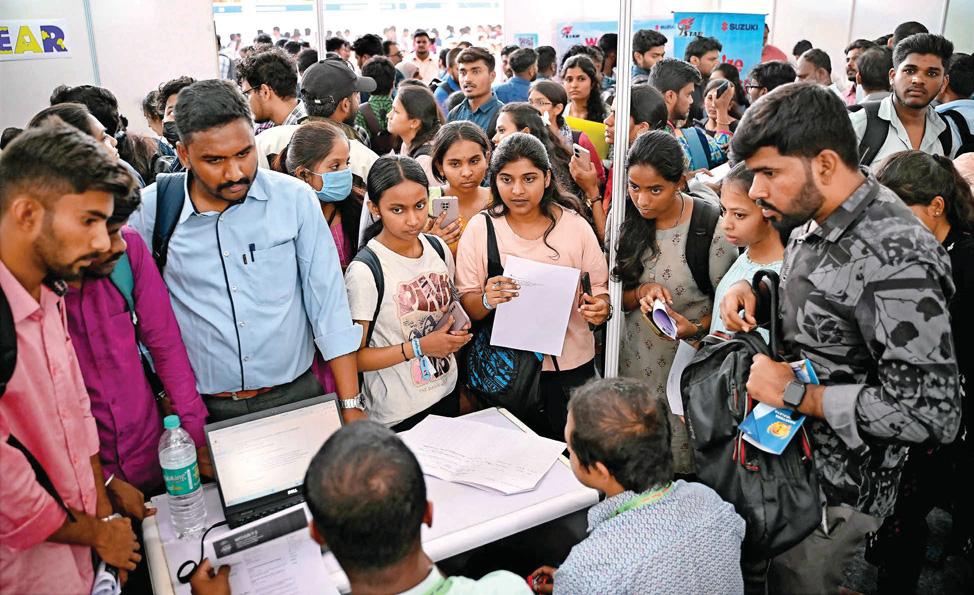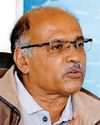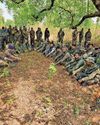From denial to grudging admission

A FEW WEEKS AGO, the Reserve Bank of India published an article on the economy. The authors claimed that eight crore jobs had been created in India in the last few years and “there is no jobs crisis in India”.
It was an astounding statement, especially from a cautious, conservative and politically neutral institution like the RBI. The claim was lapped up by the BJP’s leaders, including the prime minister who mentioned it in one of his speeches.
The finance minister was silent. The chief economic adviser looked away. The NITI Aayog, that often sprang up to make bizarre claims, did not make any comment. No one asked the RBI questions such as how the claim was made, what kind of jobs were created, where were the jobs and who were the beneficiaries.
The RBI’s claim and the government’s tacit endorsement ran contrary to the evidence around us:
The Uttar Pradesh Police department conducted an examination to recruit 60,244 positions in the state police, mostly constables. More than 48,00,000 persons, including 16,00,000 women, wrote the examination. (The examination was cancelled after a few days).
Air India wanted to fill 2,216 vacancies of ‘handyman’, a job that involved diverse repair and maintenance duties. Some 25,000 persons thronged the Mumbai airport for a walk-in interview, and police had to step in to maintain order.
Diese Geschichte stammt aus der August 04, 2024-Ausgabe von THE WEEK India.
Starten Sie Ihre 7-tägige kostenlose Testversion von Magzter GOLD, um auf Tausende kuratierte Premium-Storys sowie über 9.500 Zeitschriften und Zeitungen zuzugreifen.
Bereits Abonnent ? Anmelden
Diese Geschichte stammt aus der August 04, 2024-Ausgabe von THE WEEK India.
Starten Sie Ihre 7-tägige kostenlose Testversion von Magzter GOLD, um auf Tausende kuratierte Premium-Storys sowie über 9.500 Zeitschriften und Zeitungen zuzugreifen.
Bereits Abonnent? Anmelden

Where Silence Speaks
Barzani National Memorial Museum in Iraqi Kurdistan offers a deeply personal glimpse into Kurdish resilience, memory and identity

SEEDS OF SORROW
Lack of structural reforms, institutional support and political will are driving farmers to suicide

The seventh nerve
Hema flew down from Srinagar to see me. She was drop-dead gorgeous: flawless skin, impeccably symmetrical eyebrows, expressive dark brown eyes, and long healthy eyelashes. Her nose looked as if it was sculpted by Michelangelo. Her cheekbones and jaw-line would make an anatomist gaze in wonder. She had bouncy burgundy hair reminiscent of Dimple Kapadia's in her youth.

Hold your fire, jingo
“IN PEACE, SONS bury their fathers. In war, fathers bury their sons,” said Herodotus 2,500 years ago.

Red storm receding
The collapse of the CPI(Maoist) command structure offers a rare opportunity for the authorities to finish off the insurgency in the red corridor and broaden development work

Beyond the bumps and Trump
It is no smooth sailing for India-US trade talks, but both governments are pushing to meet the deadline

No area is now safe for Naxals
Behind the recent killing of CPI(Maoist) general secretary Basavaraju in Chhattisgarh is the lesser known District Reserve Guard (DRG), the anti-Naxal arm of the state police that includes ex-Maoists.

Field marshals and failed marshals
Politicians generally distrust war-winning generals. In Pakistan, they distrust war-losing generals.

Pakistan's deep state
There is an invisible clique that ensures that certain ideas and issues are never compromised. Ayesha Siddiqa, senior fellow at the Department of War Studies at King’s College in London, and author of the acclaimed Military Inc.: Inside Pakistan’s Military Economy, gives her views on this invisible entity

Marshal law
How Asim Munir has Pakistan in an economic and military stranglehold
